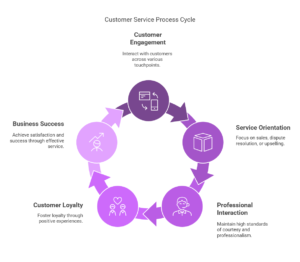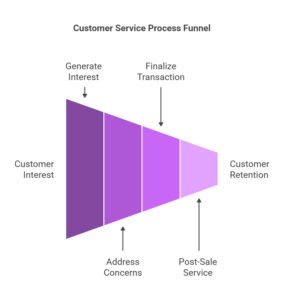Effective customer service process – how to create it?

How to build an effective customer service process in a company? Schematics and process principles
Random and unstandardized customer service is one of the major mistakes entrepreneurs make. This area should be carefully structured to prevent potential mishaps and maintain consistent, high standards. The goal is to build trust and ensure a high level of customer satisfaction. In this article, you will learn what comprehensive customer service consists of and how to develop it to benefit your business.
Customer service process – a broad concept
First, it is important to recognize that customer service is a highly complex subject. It is not just about direct interaction between a specialist and a customer but also includes all other touchpoints where the customer engages with your brand. In practice, customer service encompasses every moment of contact with the client, including their navigation through an online store. Customer service can be oriented towards product sales, resolving disputes (e.g., handling complaints), upselling, customer satisfaction research, and more. Regardless of the reason for customer interaction, it should always be maintained at the highest professional level, conducted with courtesy, and focused on the customer’s best interests. A well-managed customer service interaction leads to customer loyalty, satisfaction, and overall business success. Do not leave anything to chance—consciously build a process that increases your chances of success.

Key stages of customer service
What are the key stages of the customer service process? While there is a standard framework, this field evolves dynamically. In practice, new stages can be added, and many steps now incorporate technological support, including artificial intelligence (AI).
Generating interest
The first stage of customer service is generating interest. This task primarily falls on marketing and advertising departments, though sometimes customers reach out on their own (e.g., based on referrals from other clients). This is a crucial stage where it is essential to understand the customer’s individual needs and expectations and respond accordingly. If your brand can provide a solution, it is important to offer the right product or service. However, sales should never be aggressive—the customer’s well-being should come first. Ethical sales practices within customer service are the key to building a strong reputation and achieving long-term success.
Addressing all questions and concerns
The next stage is answering any questions or concerns the customer may have. It is natural for a customer to be uncertain about a product or service or to want a deeper understanding of its features. The key here is to present the real value of the offering and guide the customer through the purchasing journey with well-structured questions. This must be done transparently, listening carefully to the customer’s needs. Only in this way can a business provide high-quality, tailored solutions while ensuring customer satisfaction. If the product or service meets the customer’s expectations, they are likely to return or recommend your brand to others. At this stage, it is essential that customer service specialists have advanced and detailed knowledge of the service they are offering, as well as strong soft skills and professional etiquette.
Finalizing the transaction or resolving a dispute
The most critical moment in the customer service process is the finalization of a transaction or the resolution of a dispute (such as an inquiry or complaint). This step must align with the company’s established standards and comply with current legal regulations. This stage is often highly emotional, leaving no room for mistakes that could be costly for the business. To maintain high-quality customer service, it is beneficial to prepare structured communication pathways and predefined workflows. Basic tasks can be efficiently handled by voicebots or chatbots, while more complex issues should be managed by human specialists.
Post-sale service and customer retention
Once a customer has explored your offer and made a purchase, the interaction should not end there. Placing an order opens up multiple opportunities for further engagement in customer service. The next step could be assessing the customer’s satisfaction with their purchase and providing post-sale support. This includes identifying additional needs that could be addressed with complementary products. It is crucial to ensure that customers do not feel abandoned after their purchase. Effective post-sale service helps retain customers over the long term, enhances brand reputation, and increases revenue. Always remember that customer interaction should not end at the point of sale. A well-thought-out customer service management process is essential for sustained business success.

How to build an effective process and maintain high customer service standards?
Now that you understand what the customer service process is, its key stages, and essential considerations, it’s important to recognize that preparing it requires experience. First and foremost, all customer service guidelines should be documented and made accessible to every specialist. Any updates should be communicated to the customer service team in real-time.
A proven approach is to create structured workflows and communication paths that specialists should follow. Depending on the type of interaction and customer needs, conversations should be conducted according to predefined questions and guidelines. Every consultant must ensure a consistent standard and quality, as this is the key to effective service. Keep track of new customer inquiries and incorporate them into the established workflow. This is an ongoing process, as each workday can bring new situations and challenges.
Today, automation is an invaluable tool in customer service, significantly enhancing efficiency. AI-powered solutions can streamline processes, reduce operational costs, and improve customer satisfaction. For instance, voicebots can handle fundamental inquiries and resolve common issues without requiring human intervention. Human agents step in only for more complex cases.
For a customer service process to be effective, its structure should include the smallest details. The more thoroughly it is documented, the higher the quality and reliability of service delivery. A dedicated call center system can also be a great asset, facilitating contact management and improving service efficiency. It is worth implementing such a system and integrating it with other tools used in this field, such as CRM platforms. More businesses are also adopting virtual PBX within their call center operations.
Technological support from EasyCall
Do you want to enhance the efficiency of your customer service team? Standardizing and optimizing this business area can significantly improve team productivity, customer satisfaction, and your company’s financial performance. Following proven workflows and paying attention to every detail is essential. At EasyCall, we provide AI-powered technological solutions that help you build a reliable and effective customer service process. Want to learn more? Contact our expert and join our satisfied clients today!
